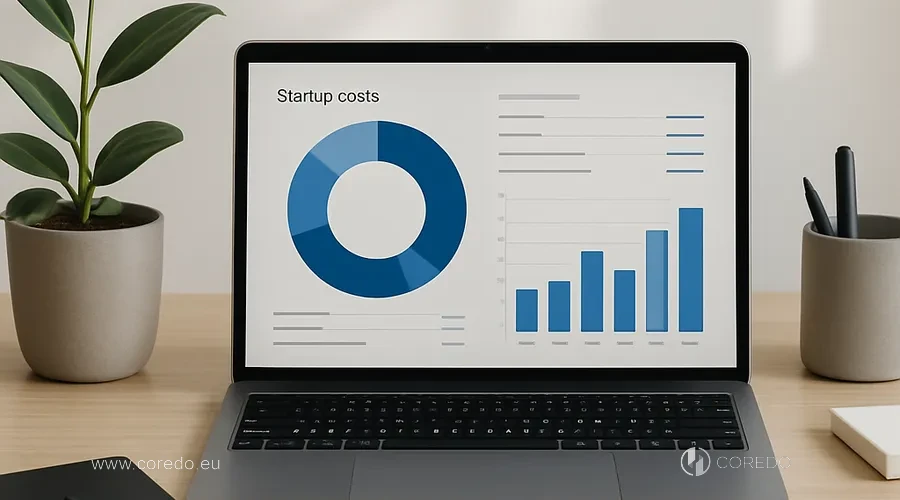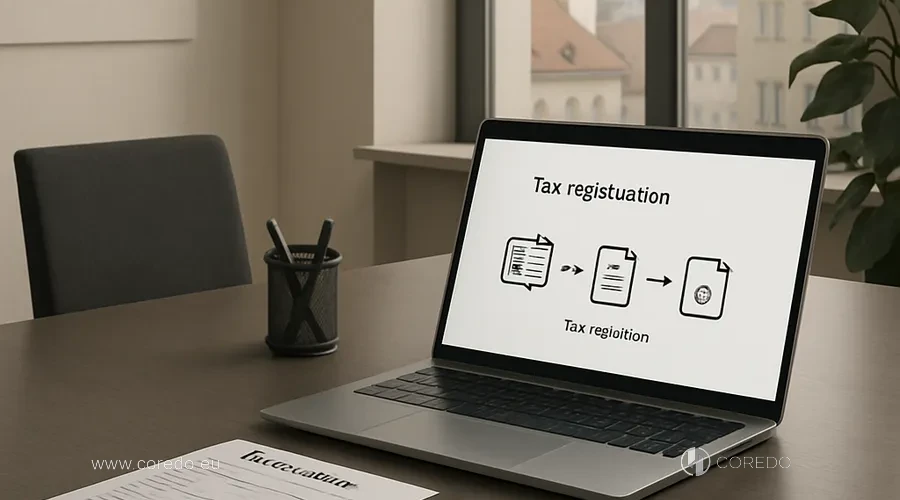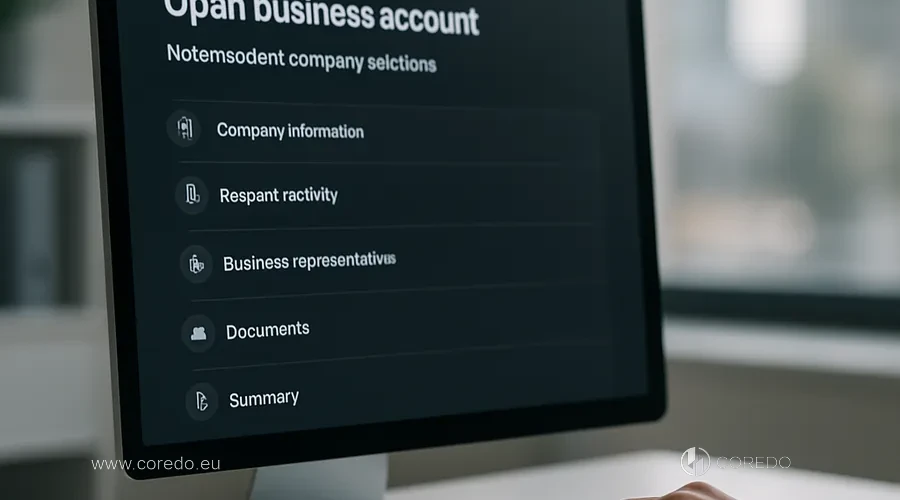Electronic residency (e-Residency), a unique program that allows entrepreneurs from anywhere in the world to access Estonia’s digital infrastructure and open a company entirely online, without physical presence. The e-Residency program Estonia is recognized as one of the most innovative in the world: according to official statistics, more than 100,000 e-residents have created over 25,000 OÜ companies, and the share of non-residents among new businesses exceeds 60%.
How to get an e-Residency card in Estonia?
The process begins with submitting an online application on the official portal. You need to provide a passport scan, a photo, a motivation letter and pay the state fee (100–120 euros depending on the country of collection). After identity verification and approval of the application, the e-Residency card is issued at one of the pickup centers: in Estonia or at overseas representations.
Timeline and stages for obtaining e-Residency:
- Submitting the application: 15–30 minutes
- Identity and data verification: 2–6 weeks
- Receiving the card: 1–2 days after notification
Data security and identity verification are key elements of the process. Estonia uses a multi-level identification system, including biometric data and a digital signature. In COREDO’s practice we have encountered situations where, to speed up the procedure, we arranged a power of attorney (Power of Attorney) for company registration in Estonia, which allowed the client to avoid spending time on visits and in-person meetings.
How can I open a company in Estonia remotely?
Step 1. Obtaining a digital identification card (e-Residency)
The application is submitted through the official portal. Required documents include a passport scan, a photo, a motivation letter and proof of payment of the fee. After review and approval of the application the e-Residency card is issued at the selected pickup point. This stage is the foundation for subsequent actions: only with an e-Residency card will you be able to use the digital signature to register an OÜ and manage the company online.
Step 2. Choosing the company form: registering an OÜ in Estonia
OÜ is a private limited company, the most popular form for non-residents. The minimum share capital in Estonia is 0.01 euro, but in practice COREDO recommends contributing from 2,500 euros to increase creditworthiness and trust from banks and counterparties. Requirements for OÜ founding documents include the articles of association, the founding agreement, and information about shareholders and directors.
Step 3. Submitting the application through the Estonian Business Register online portal
OÜ registration is carried out completely online.
- Choosing the company name (checked for uniqueness)
- Determining the main activity (EMTAK code)
- Specifying the company’s legal address in Estonia (a virtual office can be used)
- Appointing a contact person (required for non-residents)
- Preparing and signing the founding documents using a digital signature
COREDO’s experience confirms: a competent choice of EMTAK code and legal address significantly speeds up the registration process and the subsequent opening of a bank account.
Step 4. Payment of the registration fee and share capital
The state fee for registering an OÜ is 265 euros and is paid through the online portal. Share capital can be contributed immediately or during the first year of operation. Payment is possible by bank card or via international payment systems.
Step 5. Receiving the B-card and founding documents
After registration you receive a B-card: basic information about the company, as well as the founding agreement and the articles of association. All documents are available electronically, signed and stored online. The solution developed by COREDO to automate this process allows clients to receive all documents and manage them through a secure cloud archive.
Cost of opening a company in Estonia in 2025

Direct costs
- State fee for OÜ registration – €265
- Obtaining e-Residency – €100–120
- Legal address and virtual office, €50–150 per year
Additional costs
- Assistance with company registration in Estonia, €200–500 (depends on complexity and scope of services)
- Opening a bank account for an Estonian company – €100–300
- Legal support for business in the EU, from €200 per month (if needed)
Table: Cost structure for registering a company in Estonia 2025
| Expense item | Amount (€) | Comment |
|---|---|---|
| State fee for OÜ registration | 265 | Payment via online portal |
| Obtaining e-Residency | 100–120 | Depending on the country of application |
| Legal address | €50–150/year | Virtual office |
| Bank account | €100–300 | Opening and maintenance |
| Legal support | €200–500 | Optional |
| Total | €715–1335 | Depending on services |
Taxes in Estonia for non-residents

Tax rates and regimes 2025
- Corporate income tax: 0% until profits are distributed, 20% on dividend payments
- VAT, 20%, registration is mandatory if turnover exceeds €40,000 per year
- Dividend tax: included in the corporate tax
Tax reporting and declarations
Reporting is submitted online via the government portal. Automation of accounting and tax reporting is possible through API integration, which reduces outsourcing costs and minimizes errors. COREDO solutions allow clients to set up automatic submission of declarations and receive deadline reminders.
Tax planning for international companies
Opening an account for an Estonian company by a non-resident

Requirements for shareholders and directors
To open an account the bank requires confirmation of the identity of shareholders and directors, as well as submission of the incorporation documents, a B-card and a business plan. Important: most banks and fintech platforms require completing KYC and providing information about beneficiaries.
Procedure for opening an account without personal presence
Integration with international banks and payment systems
Estonian companies OÜ can open accounts not only in local banks but also on European fintech platforms, which speeds up integration with international payment systems and makes working with multi-currency settlements easier.
Legal support and AML/KYC during company registration

Compliance with AML and KYC requirements
Since 2025 Estonia has tightened AML (anti-money laundering procedures) and KYC (Know Your Customer) requirements. Registration and opening an account require disclosure of beneficiaries, confirmation of the source of funds and verification of business reputation. COREDO’s experience shows: correct documentation and transparency of structure speed up approval by banks and regulators.
Risk management in company registration
Key risks – refusal of registration, account blocking, fines for non-compliance with AML/KYC. COREDO’s practice confirms: a comprehensive audit of documents and preliminary risk assessment help minimize delays and avoid legal consequences.
Legal consultations for business registration and support
Expert support at all stages – from choosing the company form to filing a tax return: allows COREDO clients to focus on developing the business without being distracted by bureaucracy and legal nuances.
How to manage a company in Estonia online?
Electronic signature for an Estonian company
The e-Residency digital ID card provides access to an electronic signature recognized across all EU countries. This allows signing contracts, filing reports and managing the company entirely online.
Managing risks of remote management
Main limitations: the need to maintain substance (business presence), cybersecurity risks and difficulties opening accounts in certain banks. COREDO’s solutions include organizing a virtual office and setting up secure channels for storing and exchanging documents.
Electronic document storage and archiving
Risks and limitations of company registration in Estonia for non-residents
Legal risks
Non-compliance with AML/KYC requirements, errors in founding documents or lack of substance can lead to refusal of registration or account blocking. In 2025 regulators tightened oversight of companies with non-residents.
Financial risks
There may be additional expenses for legal support, opening accounts and maintaining substance. COREDO’s experience shows: transparent planning and audit of the business model can minimize these risks.
Risks of non-compliance with EU legislation
Violation of EU rules (for example, GDPR, tax directives) can lead to fines and restrictions on operations. The solution implemented by COREDO includes regular monitoring of legislative changes and adaptation of clients’ business processes.
Practical steps for entrepreneurs

- Obtain an e-Residency card and set up an electronic signature
- Choose the company form (OÜ), prepare the founding documents
- Register the company through the online portal, pay the fee
- Arrange a legal address and choose a reliable contact person
- Prepare a package of documents to open a bank account
- Set up accounting and reporting automation
- Conduct an audit for compliance with AML/KYC and substance requirements
- Use secure channels for storing and exchanging documents
COREDO’s practice confirms: following these steps consistently makes it possible to open a company in Estonia remotely without a visit, minimize costs and reduce legal risks.
ROI and business prospects through company registration in Estonia
Metrics of ROI when opening a company in Estonia include speed of entry into the EU market, reduced tax burden, lowered operating costs, and increased trust from European partners. Estonia: it is not only a convenient jurisdiction for registering an OÜ, but also a real tool for scaling a business in the EU, integrating with international payment systems, and attracting investment.
If it is important for you not just to register a company, but to receive comprehensive support, minimize risks and ensure process transparency – the COREDO team is ready to become your reliable partner in Estonia and the EU.